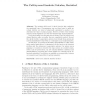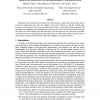198 search results - page 1 / 40 » Time Equations for Lazy Functional (Logic) Languages |
AGP
2003
IEEE
14 years 9 days ago
2003
IEEE
There are very few approaches to measure the execution costs of lazy functional (logic) programs. The use of a lazy execution mechanism implies that the complexity of an evaluation...
ICFP
2009
ACM
14 years 7 months ago
2009
ACM
Functional logic programming and probabilistic programming have demonstrated the broad benefits of combining laziness (non-strict evaluation with sharing of the results) with non-...
CORR
2004
Springer
13 years 6 months ago
2004
Springer
Many functional logic languages are based on narrowing, a unification-based goal-solving mechanism which subsumes the reduction mechanism of functional languages and the resolutio...
ESOP
2012
Springer
12 years 2 months ago
2012
Springer
The existing call-by-need λ calculi describe lazy evaluation via equational logics. A programmer can use these logics to safely ascertain whether one term is behaviorally equivale...
DFT
2007
IEEE
14 years 1 months ago
2007
IEEE
We propose and evaluate the use of lazy error detection for a superscalar, out-of-order microprocessor’s functional units. The key insight is that error detection is off the cri...


